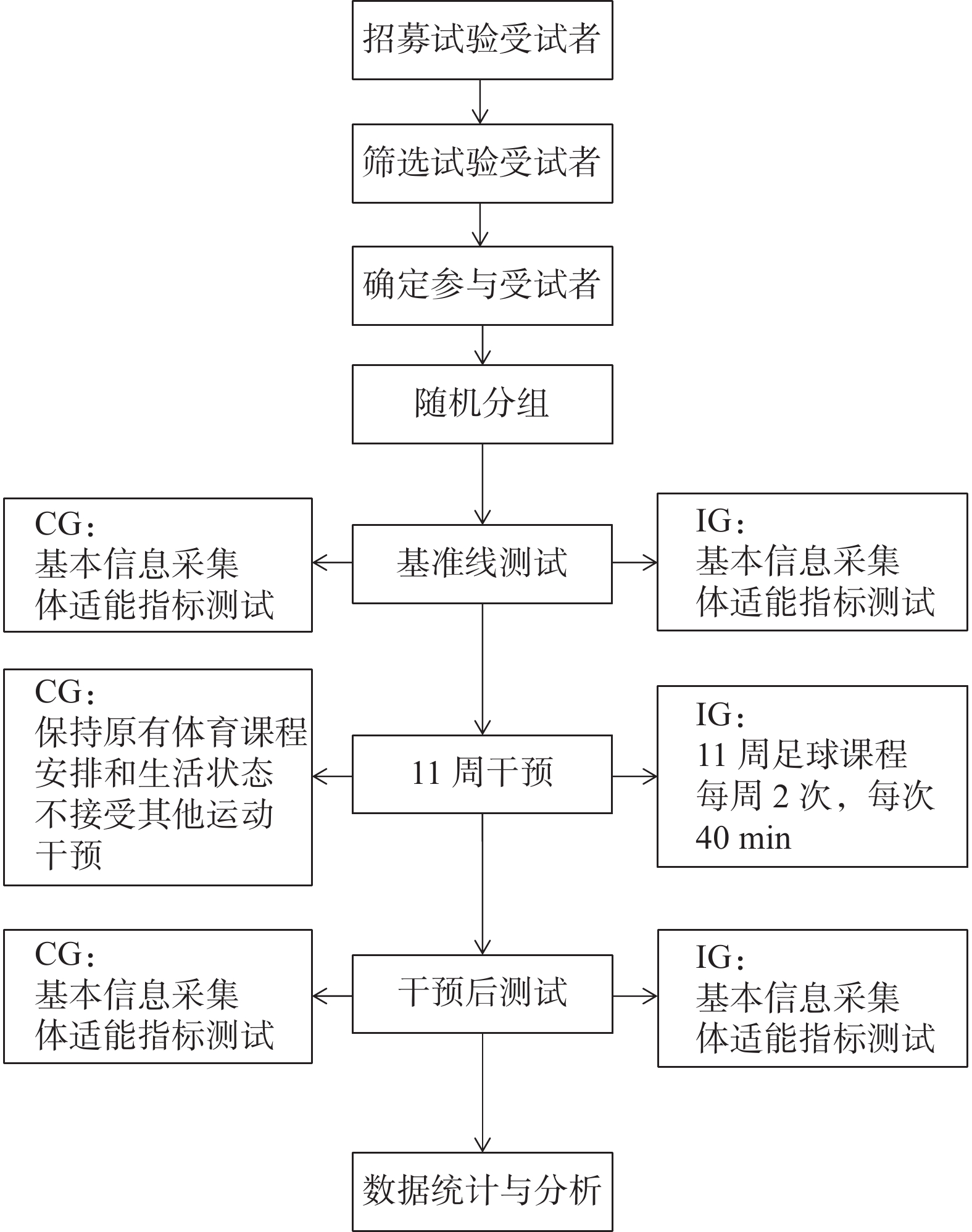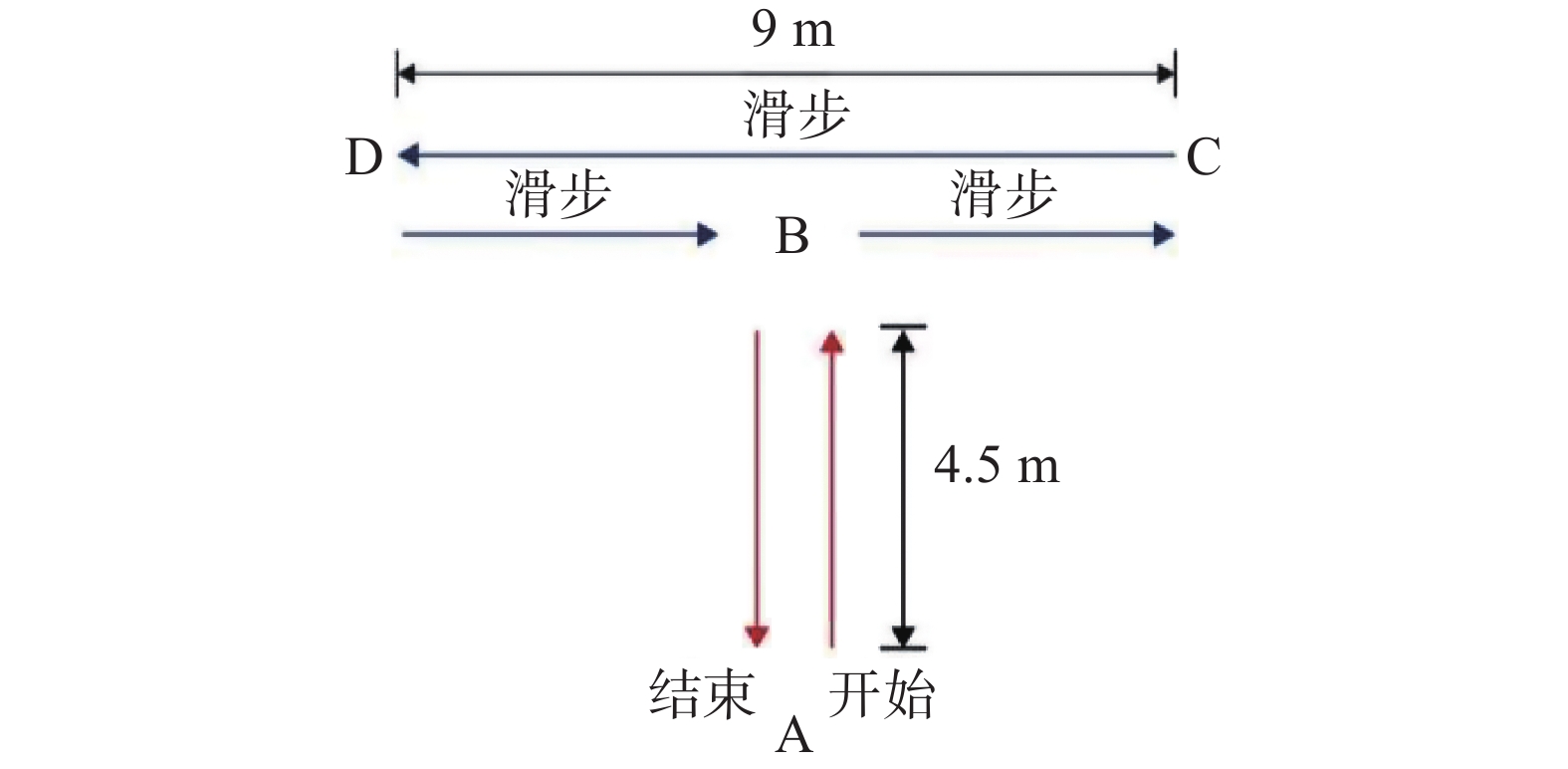Effect of "FIFA 11 For Health" on Physical Fitness in 9 to 12 Year-old Children
-
摘要:目的
基于国际足球联合会开发的“FIFA 11健康”足球课程(以下简称“足球课程”),对上海市9~12岁儿童进行干预,分析其对儿童体适能的影响。
方法将174名四~五年级儿童随机分成对照组[CG:n=86,年龄(10.1±0.7)岁,身高(143.5±6.6)cm,体质量(37.1±9.6)kg]和干预组[IG:n=88,年龄(10.2±0.7)岁,身高(143.3±6.1)cm,体质量(36.9±7.2)kg]。IG接受为期11周、每周2次、每次40 min的足球课程干预,课程内容包括足球技能、健康卫生知识和小场地比赛等;CG保持原有常规体育活动。在干预前后评估2组受试者的身体成分、坐位体前屈、闭眼单脚站立、原地纵跳、30 m冲刺跑、T型折返跑以及Yo-Yo儿童间歇恢复1级测试(YYIR1C)成绩。
结果经过11周足球课程干预,与CG相比,IG的体脂率[(−0.4±4.2)% vs.(−1.8±4.3)%]、T型折返跑用时[(0.2±1.0)s vs.(−0.5±1.3)s]显著减少(P<0.05);瘦体质量[(−0.2±4.0)kg vs.(1.0±0.8)kg]、原地纵跳距离[(−0.2±3.7)cm vs.(1.7±3.3)cm]、YY1R1C成绩[(42.6±245.8)m vs.(168.3±216.7)m]显著增加(P<0.01)。IG的坐位体前屈成绩和基础代谢量增加,但组间差异无统计学意义;2组的闭眼单脚站立用时和30 m冲刺跑成绩均无变化。
结论11周足球课程干预有助于改善9~12岁儿童的身体成分、肌肉功能、心肺功能等体适能指标。学校场域下的足球课程干预可能对预防儿童肥胖、提高体适能水平、促进体质健康有一定的积极效益。
-
关键词:
- “FIFA 11健康”足球课程 /
- 儿童 /
- 校园足球 /
- 健康教育 /
- 体适能
Abstract:ObjectiveTo evaluate the effect of the school-based intervention "FIFA 11 for Health" program on health and physical fitness in 9- to 12-year-old children in Shanghai.
Methods174 4-5th grade students were randomly divided into control group [CG: n=86, (10.1±0.7) years, (143.5±6.6) cm, (37.1±9.6) kg] and intervention group [IG: n=88, (10.2±0.7) years, (143.3±6.1) cm, (36.9±7.2) kg. As part of the physical education (PE) curriculum, IG carried out 2 weekly 40 min "FIFA 11 for Health" sessions focusing on health issues, football skills and small sided games. CG continued regular school PE activities. Measurements of body composition, sit and reach test, eye closed and single leg stand balance, counter movement jump, 30 m sprint, T-drill and Yo-Yo Intermittent Recovery Level 1 Children’s Test (YYIR1C) were performed before and after the 11-week study period.
ResultsDuring the 11-week intervention period, body fat percentage [(−0.4±4.2)% vs. (−1.8±4.3)%] and T-drill test [(0.2±1.0) s vs. (−0.5±1.3) s] decreased significantly (P<0.05) in IG than in CG; lean body mass [(−0.2±4.0) kg vs. (1.0±0.8) kg], YYIR1C (42.6±245.8) m vs. (168.3±216.7) m] and CMJ performance [(−0.2±3.7) cmvs. (1.7±3.3) cm] increased significantly (P<0.01) in IG than in CG. Within-group improvements were observed only in IG for sit and reach test and basal metabolism, but this change was not significantly different from that in CG, and balance and sprint fitness remained unchanged in both groups.
ConclusionsThe modified "FIFA 11 for Health" program has beneficial effects on body composition, muscular performance and cardiovascular fitness in 9- to 12-year-old children, supporting the notion that school-based football interventions can facilitate health of children and serve as a positive step in the prevention of obesity diseases and promotion of physical fitness.
-
Keywords:
- "FIFA 11 For Health" program /
- children /
- campus football /
- health education /
- physical fitness
-
自2014年起我国将全民健身上升为国家战略,相继出台了《中国足球改革发展总体方案》(2015年)、《中国足球中长期发展规划(2016—2050)》(2016年)、《“健康中国2030”规划纲要》(2016年)、《体育强国建设纲要》(2019年)等重要文件。党的十八大以来,党中央把振兴足球作为发展体育运动、建设体育强国的重要任务,为我国足球发展带来了前所未有的机遇[1]。因此,大力发展校园足球恰逢其时,但校园足球发展也面临诸多困境:“足球育人”理念尚未得到充分体现、“足球操”等形式主义怪象频出[2]。同时,我国儿童的体适能水平也不容乐观,“小胖墩”“小眼镜”等健康问题已成为全社会关注的热点。
儿童体适能水平的下降已成为全球关注的公共卫生课题[3]。国际足球联合会(FIFA)于2012年开发了“FIFA 11健康 ”(“FIFA 11 For Health”)项目,基于足球的锻炼方法,在儿童中进行健康卫生知识宣教,并引入定期体力活动,以使儿童从足球运动中获益[4]。2015年,丹麦成为欧洲第1个实施“FIFA 11健康”足球课程(以下简称“足球课程”)的国家,该课程包括为期11周、每周2次的交互式足球训练,2次训练至少间隔2 d。第1次训练为“踢足球”,教授一些踢足球的技巧,第2次训练为“公平比赛”,强调通过主动的足球训练进行健康卫生知识宣教,2次训练都将小场地比赛(small-sided games)作为干预过程中的主要身体刺激[5]。
近年来,我国有关校园足球的研究成果丰硕:毛振明[6]对校园足球教学、竞赛等进行“新”与“旧”的理论思辨;杨献南等[7]对校园足球特色学校的研究认为,当前仍存在标准科学性、遴选程序性、区域配比性、显性政绩性等问题。此外,李卫东等[8]针对校园足球发展困境,深入剖析了发展“真义”、内容形式、条件保障、管理运行等全局性问题。在校园足球教学方面,张晓贤[9]基于美国SPARK课程理念提出基于课程大纲、教学指导、比赛指导三要素的校园足球校本课程开发,张诚等[10]从动作学习理论视角研究校园足球教材的课程设置规律提出12~14岁阶段“青春期尴尬”的干扰现象。然而,关于足球训练或教学课程对儿童体适能促进的相关研究成果较少,尤其是国内尚未有足球课程对儿童体适能干预效果的相关研究。丹麦在最初实施足球课程干预时,仅报告了该课程能改善儿童心血管和代谢健康,也能显著增加儿童的健康卫生知识,但未评价对体适能指标(心肺功能、灵敏度、肌肉力量等)的影响。
本文探讨足球课程对我国9~12岁儿童体适能的影响,以期为完善我国校园足球教学理论体系提供一定的参考,为提高我国儿童体适能水平、促进体质健康贡献力量。
1. 研究对象与方法
1.1 研究对象
选取上海大学附属小学的四~五年级儿童进行为期11周的随机对照试验,将受试者随机分成干预组(Intervention Group,IG)和对照组(Control Group,CG)2组。试验开始前,所有受试者及其监护人均被告知研究目的、内容和要求,同时须签署知情同意书,以表示自愿参加本试验;对受试者的健康状况进行严格评价,排除外伤、严重心血管疾病患者,并在运动前进行体力活动准备问卷[11](Physical Activity Readiness Questionnaire ,PAR-Q)调查,以防在运动中出现偏差。PAR-Q是美国运动医学学会(ACSM)[12]推荐使用的运动前健康筛查问卷。
总计176名儿童参与本试验,其中有2人因不同原因(身体状况不佳、监护人不同意等)被排除,最后有174名受试者符合研究要求。受试者基本信息如表1所示。
表 1 受试者基本信息 (M±SD)Table 1. Information of participants基本信息 CG(n=86) IG(n=88) 年龄/岁 10.1±0.7 10.2±0.7 性别(男/女) 49/37 50/38 身高/cm 143.5±6.6 143.3±6.1 体质量/kg 37.1±9.6 36.9±7.2 BMI/(kg·m−2) 17.9±4.1 18.0±3.1 在11周足球课程干预后,CG因生病住院未参加测试流失1名受试者,IG因课程冲突未完成干预流失1名受试者,总流失率为1.14%<5%。IG受试者完成11周足球课程干预平均参与21.6次(20~22次),平均参与率为98.1%,依从性较好。与此同时,在足球课程干预过程中无不良事件(如运动损伤等)发生。
1.2 研究方法
试验时间为2020年9月—12月。要求CG受试者保持原有体育课程安排和生活状态,IG受试者在运动监控状态下进行为期11周、每周2次、每次40 min的足球课程代替常规体育课。在课程开始前和结束后1周内,IG和CG进行相关指标测试,干预前后测试的指标相同,由同1名研究者在同一时段进行。在试验开始前,每个班级指派2名教师(要求具有中国足球协会D级及以上等级教练员证书)参加为期1 d的“FIFA 11 健康”足球指导课程并获得教学手册,指导课程内容包含项目相关信息、每次干预的具体介绍以及信息单等。具体研究流程如图1所示。
小学阶段体育课程每周4节,每节40 min,在常规体育课规定的时间内,IG每周开展2次足球课程,且这2次课程至少间隔2 d,另外2次仍为常规体育课。在课程开始前IG和CG完成基准线(baseline)测试。足球课程内容大纲如表2所示:每周的第1次训练为“踢足球”,通过足球相关的比赛和活动,传授足球技能、团队合作精神和互相尊重理念;每周的第2次训练为“公平比赛”,通过足球相关活动,教授儿童健康卫生相关知识;每次干预都包括小场地比赛(3V3—5V5),作为主要的身体刺激。
表 2 足球课程内容大纲Table 2. Overview of modified "FIFA 11 for Health" program课程 第1次
训练:踢足球第2次
训练:公平比赛健康卫生知识主题 1 热身 玩足球 准备锻炼和运动 2 传球 尊重女性 尊重和帮助女性 3 头球 远离新冠肺炎病毒& 了解新冠肺炎* 4 带球 避免烟草和酒精 避免不健康嗜好 5 控球 控制体质量 科学运动和合理膳食 6 防守 洗手 培养良好卫生习惯 7 停球 饮水 饮用干净的水 8 体能 保持健康 均衡饮食 9 射门 接种疫苗 预防疾病 10 守门 遵医嘱服药 正确服药 11 团队合作 公平比赛 回顾1~10周课程内容 注:根据我国现实情况略有修订,&表示由“远离艾滋病等性传播疾病”改为“远离新冠肺炎病毒”;*表示由“预防艾滋病等性传播疾病”改为“了解新冠肺炎”。 同时,采用学术研讨的方式,征询来自上海市教育委员会、上海市足球协会、职业足球俱乐部及上海体育学院等单位的学界专家的意见,对足球课程进行适度改良。邀请7名相关领域(体育学、教育学、管理学等)专家对改良后的课程主题内容和主题内容所包含的教学方案等进行检查,并提出修改意见。研究人员根据专家意见,对改良后的主题内容进行调整,编制成正式课程的主题内容。7位受邀专家均认为改良后的主题内容达到了适用(75%~100%)和较为适用(0~25%)水平(表3)。
表 3 改良后课程主题内容的质量和效度检验结果Table 3. The quality and validity test results of modified "FIFA 11 for Health" content姓名 职称/职务 研究方向 所在单位 认为主题内容适用占比/% 认为主题内容较为适用占比/% W1 教授 学校体育 上海体育学院 75 25 C2 教授 学校体育 上海师范大学 100 0 L3 研究员 教育政策 上海市教育委员会 100 0 H4 副研究员 体育管理 上海市体育局 75 25 L5 教授 运动健康促进 广州体育学院 100 0 C6 欧足联B 运动训练 上海海港足球俱乐部 100 0 G7 亚足联C 体育管理 上海市足球协会 75 25 注:7位受邀专家的姓名用“字母+数字”的形式代指;“欧足联B”和“亚足联C”为足球教练员等级,“欧足联B”相当于高级教练员水平,“亚足联C”相当于中级教练员水平。 1.3 基本信息采集与体适能指标测试
基本信息采集:足球课程干预前,采集所有受试者的学校、年级、班级、性别、年龄等信息。
体适能指标测试:所有指标测试在干预前和干预后的1周内完成,测试地点为上海大学附属小学田径场。测试内容包括身高、体质量、身体成分、坐位体前屈、闭眼单脚站立、原地纵跳、30 m冲刺跑、T型折返跑以及Yo-Yo儿童间歇恢复1级测试(YYIR1C)。所有测试按照相同顺序在同1天进行。首先,将受试者分成6~8人的小组:一组检测身体成分、坐位体前屈及闭眼单脚站立;另一组测试原地纵跳、30 m冲刺跑和T型折返跑。其次,每2组测试完成后进行轮换,以便所有受试者接受上述所有测试。最后,所有受试者在同一时间进行YYIR1C。要求受试者在测试前1天避免剧烈运动。
(1)身体成分测试使用可移动式身高测量仪(InBody-BSM 170,韩国首尔)测量身高,精确到0.1 cm。测量时受试者赤脚站立,足跟靠墙,目视前方。使用多频八级生物电阻抗人体成分分析仪(InBody 370,韩国首尔)测量体质量、体脂率和瘦体质量(LBM)。已有研究[13]在肥胖儿童中使用双能X射线测定法验证了生物电阻抗分析技术的可靠性。测量时受试者穿着轻便衣服、赤足站于仪器上。
(2)坐位体前屈是反映人体在静止状态下躯干及下肢柔韧性的指标。使用坐位体前屈测试仪(华聚101坐位体前屈测试仪,中国宁波)进行测试,受试者赤足面向仪器,并坐在座板上,双腿自然向前伸直,脚跟并拢,测试人员调整导轨使游标下缘高度与受试者脚尖平齐。测试时,受试者双手并拢,掌心向下,缓慢向前推动游标至不能推动为止,连续测试2次,取最好成绩。测试值以cm为单位,精确到0.1 cm。
(3)闭眼单脚站立是一种反映人体平衡能力的简易测试手段。要求受试者双脚站定,双手叉腰或自然垂下,待测试人员发出“开始”口令,受试者闭眼,统一用惯用脚支撑,抬起非支撑脚。当受试者支撑脚移动或非支撑脚着地时,测试结束,记录用时。连续测试2次,取最好成绩。测试值以s为单位,精确到0.1 s。
(4)原地纵跳是常见的测试下肢肌群爆发力的有效手段之一。使用纵跳仪(科导TZCS-1纵跳仪,中国宁波)测试,当主机显示“0.0 cm”时,受试者踏上纵跳板,双脚自然分开。开始测试时,受试者屈膝,双臂后摆,尽力垂直向上跳起,当受试者落回纵跳板后,采集测试数值。连续测试2次,取最好成绩。允许受试者在测试前熟悉流程,测试值以cm为单位,精确到0.1 cm。
(5)30 m冲刺跑是常见的足球运动员专项素质测试项目。起跑姿势统一为站立式起跑,测试人员发出“预备——跑”口令时,受试者从起点出发,冲刺跑至终点(30 m)处,记录成绩。此项测试进行2次,测试之间保证充足的休息,取最好成绩。测试值以s为单位,精确到0.1 s。
(6)T型折返跑又称T字跑,是一种常用的灵敏性测试方法。如图2所示,在测试场地上以“T”字形状摆放4个标志桶(A、B、C、D),A为起点和终点,A与B相距4.5 m,C与D相距9 m,B为C和D的中点。测试人员发出“开始”口令,受试者首先从A点冲刺跑至B点,然后向右滑步至C点,再滑步至D点,紧接着滑步返回B点,最后倒退跑至A点,记录用时。连续测试2次,取最好成绩。允许受试者在测试前熟悉流程,测试值以s为单位,精确到0.1 s。
(7)YYIR1C在室外足球场进行,如图3所示,测试前进行固定的热身活动,在16 m跑道两端做好标记。受试者按照音乐指令指示的速度进行2×16 m跑,中间有10 s的休息时间,其间受试者在起点后方的4 m标记处进行慢跑,然后回到起点。随着测试的进行,跑步速度逐渐增加。当儿童不能保持与音乐指令一致的速度时,结束跑步,记录结果。测试一直进行至儿童不能维持所需的速度时为止,持续时间一般为2~10 min。YYIR1C已被验证具有较高的可靠性和有效性[14]。
1.4 统计学分析
遵循意向性分析原则,中途退出或未参加测试的受试者数据也会被纳入最终的整体数据分析。受试者基本信息和体适能指标测试结果均采用平均值±标准差(M±SD)的形式表示。IG与CG组内差异(干预前vs.干预后)采用配对样本t检验,IG与CG干预前后的组间差异(IG vs.CG)采用重复测量方差分析,显著性水平设为P<0.05。
2. 研究结果
2.1 身体成分指标测试结果
在基准线状态下,IG与CG的体脂率无显著性差异(P>0.05),经11周干预后,CG体脂率无显著变化,IG体脂率则显著下降(P<0.01),且与CG相比,IG体脂率的下降幅度存在显著组间差异(P<0.05)。IG的LBM增加幅度与CG相比存在显著组间差异(P<0.01)。此外,IG的基础代谢量也显著增加(P<0.01),但与CG相比,改善幅度无显著组间差异(P>0.05)。见表4。
表 4 干预前后身体成分指标测试结果(M±SD)Table 4. Body composition results of groups via intervention指标 CG(n=86) IG(n=88) ΔCG(n=86) ΔIG(n=88) 组间差异
(IG vs. CG)干预前 干预后 干预前 干预后 身高/cm 143.5±6.6 144.7±7.3 143.3±6.1 144.2±6.5 1.2±2.2** 1.0±1.0** −0.3 体质量/kg 37.1±9.6 40.4±10.3 36.9±7.2 39.6±7.5 3.4±5.6** 2.6±3.8** −0.8 BMI/(kg·m−2) 17.9±4.1 19.1±3.9 18.0±3.1 18.9±2.9 1.2±2.4** 1.0±1.7** −0.2 体脂率/% 27.7±5.6 27.3±6.1 27.8±5.1 26.0±5.5 −0.4±4.2 −1.8±4.3** −1.4≠ LBM/kg 14.8±3.4 14.6±3.2 14.9±2.5 15.8±2.7 −0.2±4.0 1.0±0.8 1.1≠≠ 基础代谢量/kcal 1001.9±208.0 1023.2±185.2 970.2±106.0 1008.1±96.6 21.3±257.3 38.0±35.6** 16.7 注:Δ表示干预前与干预后的差值;** 表示干预前与干预后相比P<0.01;≠表示IG与CG干预前后变化的组间差异P<0.05;≠≠表示IG与CG干预前后变化的组间差异P<0.01。 2.2 肌肉功能与心肺功能指标测试结果
在基准线状态下,IG与CG的坐位体前屈成绩、T型折返跑成绩均无显著性差异(P>0.05)。干预后IG的T型折返跑成绩显著下降(P<0.05),组间差异显著(P<0.05);干预后IG原地纵跳成绩显著上升(P<0.01),组间差异显著(P<0.01)。干预后IG 的YYIR1C成绩显著提高(P<0.01),组间差异显著 (P<0.01)。干预后IG的坐位体前屈成绩显著提高(P<0.01),但与CG相比,改善幅度无显著组间差异(P>0.05)。在闭眼单脚站立时间和30 m冲刺跑成绩等指标方面,2组受试者均无显著变化(P>0.05)。见表5。
表 5 干预前后肌肉功能与心肺功能指标测试结果(M ± SD)Table 5. Muscular and cardiopulmonary fitness results via intervention指标 CG(n=86) IG(n=88) ΔCG(n=86) ΔIG(n=88) 组间差异
(IG vs. CG)干预前 干预后 干预前 干预后 坐位体前屈/cm 6.8±6.1 7.1±6.6 6.9±6.2 8.0±6.2 0.3±3.3 1.1±3.1** 0.8 闭眼单脚站立/s 37.0±24.8 37.1±23.6 35.4±28.1 37.4±26.3 0.1±11.2 2.0±13.0 1.9 原地纵跳/cm 25.4±4.2 25.3±4.0 25.2±5.0 26.9±4.3 −0.2±3.7 1.7±3.3** 1.9≠≠ T型折返跑/s 16.1±1.8 16.3±1.8 16.0±2.6 15.4±1.9 0.2±1.0 −0.5±1.3** −0.7≠ 30 m冲刺跑/s 6.7±0.9 6.6±0.8 6.6±0.8 6.5±0.7 −0.1±0.6 −0.1±0.5 <0.01 YYIR1C/m 531.1±205.6 573.6±154.2 523.2±206.8 691.5±287.4 42.6±245.8 168.3±216.7** 125.7≠≠ 注:Δ表示干预前与干预后的差值;** 表示干预前与干预后相比P<0.01;≠表示IG与CG干预前后变化的组间差异P<0.05;≠≠表示IG与CG干预前后变化的组间差异P<0.01。 3. 讨 论
儿童青少年肥胖已成为全球重大公共健康问题[15-17]。自2000年以来,全球儿童青少年(5~19岁)的肥胖患病率从2.9%增至6.8%。儿童超重比例也明显上升,全球约有3830万(5.6%)5岁以下儿童超重。寻找有效的干预方法预防儿童青少年肥胖、提高体适能水平已成为医学、体育学等领域的重要研究课题[18]。本文结果显示,为期11周、每周2次并结合健康卫生知识宣教的足球课程与常规体育课程相比,能有效改善9~12岁儿童的身体成分、心肺功能和其他体适能指标。在干预期间,未观察到严重不良事件,表明足球课程具有一定的安全性和有效性。
3.1 足球课程干预改善身体成分
慢性非传染性疾病正逐渐成为导致人类死亡的首要因素[19],其中发病率较高的包括心血管疾病、糖尿病、肥胖等,而这些疾病之间也存在相互作用关系。成年期心血管疾病的前兆始于儿童期,而儿童肥胖正是心血管风险的重要影响因素[20]。相关meta分析[21]认为,学校场域下的体育活动或项目可有效降低儿童肥胖率,提高体适能水平。
Seabra等 [22]研究发现,每周3次、每次60 min、为期6个月的足球训练干预可使8~12岁超重儿童的全身脂肪含量减少约1.3 kg(P<0.05)。本文对2组受试者干预前后各项指标比较分析后发现,11周足球课程可有效降低IG体脂率[(−1.8±4.3)%,P<0.01],IG与CG相比,前后差异也具有显著性(−1.4%,P<0.05),这与其他持续6周至1年的校内运动干预研究[23-24]结果一致。Milanović等[25]通过meta分析得出,持续12周、每周3次、每次60 min的休闲足球运动干预可有效减少超重和肥胖儿童身体总脂肪含量(1~3 kg),这对预防和干预儿童肥胖具有临床研究意义。
休闲足球运动过程中往往包含较多的间歇性中低强度运动,这在一定程度上能增加脂肪氧化供能的比例,促进脂肪消耗[26]。Cvetković等[27]对42名11~13岁超重或肥胖儿童(BMI>20.5 kg/m2)分别进行休闲足球训练与高强度间歇性训练(HIIT)干预,结果显示:足球训练组体脂率下降2.78%(95%CI:−4.22~−1.34),HIIT组体脂率下降1.7%(95%CI:−4.78~1.38),进一步证实了休闲足球运动在降低儿童体脂率方面的有效性;相较HIIT组,足球运动组在包含体脂率在内的所有体适能指标上都获得了更大幅度的改善或提高,认为休闲足球运动具有较高的总能量消耗,从而直接促进身体脂肪含量的减少和体适能水平的提高。同时,饮食结构与生活方式均与身体成分的变化息息相关。Ørntoft等[28]对546名丹麦10~12岁儿童进行足球课程干预的探索性试验,认为课程中“公平竞赛”内容涵盖了“均衡膳食”“高强度运动的重要性”“良好的生活习惯”等健康主题,影响了IG受试者在干预期间的生活习惯,可能对身体成分的改善有一定的积极效益。此外,与CG相比,IG在干预后的基础代谢量也会显著升高(P<0.01),基础代谢量的升高会增加机体总能量消耗,在能量摄入一定的情况下会出现能量负平衡,从而降低体脂率[29]。
本文结果显示,IG的LBM在干预后显著增加[(1.0±0.8)kg,P<0.01],这与之前的运动干预研究[22, 30]结果一致。Skoradal等[31]研究发现,在足球运动干预儿童青少年体成分过程中存在一定的性别特异性差异:女生LBM较男生增加更多,男生体脂率下降较多,这可能与女生(10~12岁)在性成熟度和生长发展方面的差异影响有关。Randers等[32]通过对不同人群序列进行足球运动干预,并对其追踪随访发现,LBM的增加可能与足球运动中多种力量训练元素或频繁的身体对抗动作有关,如运球、射门、冲刺、跳跃、转身等。在这种情况下,短暂而剧烈的运动不仅可增加骨骼肌的肌纤维数量和体积,还可增强机体内骨骼肌功能标志物及其代谢适应能力,这对降低身体脂肪含量也有明显作用。较高的LBM还可诱导机体内葡萄糖转运体增加,提高胰岛素敏感性,改善葡萄糖代谢,而肥胖儿童的胰岛素反应与多种心血管风险因素有关,具有重要的临床意义[33]。
3.2 足球课程干预增强肌肉功能
肌肉功能是维持身体健康的重要因素。Plowman[34]认为,均衡、健康的骨骼肌系统功能要求肌肉能产生足够的力量(肌肉力量)、耐受疲劳(肌肉耐力)、快速地产生力量(肌肉爆发力)、在关节活动范围内自如地伸展及活动(肌肉柔韧性)。儿童时期的肌肉健康还与肥胖、糖尿病前兆等存在负相关关系,与骨密度存在正相关关系[30, 35]。本文结果显示,IG原地纵跳、T型折返跑等项目的成绩均有显著提升(P<0.01),这与前人研究结果类似。Faude等[36]对22名超重儿童进行为期6个月的足球训练干预后发现,足球训练组的原地纵跳成绩显著增加(2.30~2.99 cm);Cvetković等[27]研究发现,经过12周干预后,足球训练组的原地纵跳成绩增加了17%,进一步证实了足球运动对提升儿童肌肉力量具有积极效应。
Helge等[37]探讨了14周休闲足球运动与慢跑对绝经前女性肌肉功能的影响,发现与慢跑组和CG相比,足球训练组垂直跳跃峰值增加了(3±6)%(P<0.05),下肢腘绳肌的最大收缩力量也显著提升[(11±25)%,P<0.05],这些改善可能部分与足球训练组体质量出现一定幅度的降低有关,也可能与肌纤维周围毛细血管数量增加、柠檬酸合成酶活性提升有关。还有研究[38]发现,经过12周的足球运动干预,IG受试者股四头肌的平均肌纤维面积增加了15%(P<0.05),认为足球运动改善肌肉力量可能归因于肌肉肥大的作用。另有直接证据[39]显示,肌肉肥大现象中ⅡA型肌纤维比例的显著增加对增强肌肉力量至关重要。此外,30 m冲刺跑常被用于评估足球运动员的专项速度素质,本文结果显示,30 m冲刺跑成绩ΔIG=(−0.1±0.5)s,ΔCG=(−0.1±0.6)s,差异无统计学意义(P>0.05),且IG与CG无显著组间差异。不能排除30 m冲刺跑对儿童而言距离过长,可能无法准确评估儿童的速度能力。今后还需更多地关注休闲足球运动如何发展或改善儿童速度能力,并提供更为准确的评估或测试方法。
通常认为青少年阶段是发展灵敏素质的敏感期,主要表现在6~11岁运动节奏感较强,7~12岁空间定位能力较发达[40]。本文中的敏捷性指标T型折返跑测试结果显示,ΔIG=(−0.5±1.3)s,ΔCG=(0.2±1.0)s,差异具有统计学意义(P<0.01),与其他研究结果一致。李阳等[41]认为,足球运动前的热身与激活、运动过程中的变向与变速、运动后的拉伸与放松等均对灵活性的提升有实用价值。同时,也可能因CG肌肉力量的增加促进了机体神经肌肉系统的适应性变化,进而改善身体控制能力,增强身体灵敏素质[42]。此外,由于足球运动的项目特征,足球比赛过程本身就包含了大量的攻防转换,本文中的足球课程在每节课中都设计了小场地比赛,在场地范围限定的比赛中,需要身体在不降低速度的情况下完成有对抗的多方向急停与急起,变向、变速、转身的次数和频率增加,从而提高了身体协调、力量和控制能力[43]。
本文结果显示,闭眼单脚站立时间ΔIG=(2.0±13.0)s,ΔCG=(0.1±11.2)s,二者无显著差异(P>0.05)。Oliveira等[44]基于meta分析也得到了类似结果。但也有研究[30]发现,10个月的小场地足球运动干预(3次/周,40 min/次)能改善8~10岁儿童的姿势平衡能力。可能的原因:①本文大多数受试者在基准线测试时的平衡能力评估结果较好,可能导致改善幅度不大;②其他类似研究干预时间较长,持续周期在12周~16个月,未来的足球干预研究可能还需关注姿势平衡改善的剂量-效应关系。
3.3 足球课程干预提升心肺功能
与健康体质量儿童相比,超重和肥胖儿童的运动表现明显下降,尤其是心肺功能较差,这在一定程度上增加了儿童罹患心血管疾病的风险[45-46]。本文结果显示,经过11周足球课程干预后,IG的YYIR1C成绩显著增加[(168.3±216.7),P<0.01],CG无显著变化,但组间差异具有统计学意义(P<0.01),这与其他研究[47-48]结果一致,表明该研究方案是可行的,能对9~12岁儿童的心肺功能产生有益影响。
有研究[36]发现,通过足球运动干预,受试者最大心率(HRmax)可显著降低,而较低的HRmax被认为与良好的心肺循环系统适应性有关。此外,足球运动干预还可降低机体安静心率(HRR),较高的HRR在生理学上往往与高血压、动脉粥样硬化等心血管疾病风险的增加呈正相关,这进一步验证了足球运动对促进心肺功能健康具有广泛益处[49]。同时, Milanović等[50]系统分析了足球训练对有氧健康的影响,发现足球干预可使最大摄氧量(VO2max)增加约3.5 mL/(kg·min)(95%CI:3.07~4.15),且比跑步和抗阻训练等其他干预方法更有效。这可能与足球运动干预尤其是足球比赛中长时间的耐力跑动与运动强度的频繁变化有关,这些因素均有助于提高VO2max。有研究[51]发现,VO2max增加5 mL/(kg·min),心血管相关疾病死亡率可显著降低39%~70%。此外,Larsen等[30]在一项为期10个月的校内足球小场地比赛干预研究中,借助超声心动图观察到8~10岁儿童舒张压呈显著降低趋势(P<0.05),室间隔厚度(IVS)、左心房体积指数及三尖瓣环平面收缩期偏移(TAPSE)等指标明显改善,提示外周血管和心脏功能的增强有助于机体耐受更高的有氧工作负荷,进而提升心肺功能[52]。
Cvetković等[27]借助佩戴Polar心率表监测足球干预过程中的运动强度,发现受试者平均运动强度为75%HRmax,其中10%的活动时间中,运动强度超过90%HRmax,类似的间歇性运动模式常诱导机体中枢(心血管)和外周(骨骼肌)产生积极的有氧适应,从而增强心肺功能。相反,Uth等[53]通过对曾接受过足球运动干预的22名老年男性进行为期5年的追踪随访发现,即使是每周自行组织足球训练的受试者(足球训练组),其静息心率、VO2max等心肺功能指标也出现了显著下降,这可能是由于足球训练组在追踪随访的5年中HRmax处于80%~90%的百分比从48.7%(SD=13.8)下降至29.9%(SD=20.6),无法维持足够的活动强度和负荷,进一步验证了足球干预中有效强度区间对心肺能力提升的重要性。
4. 结论与不足
本文结果显示,11周足球课程干预结合小场地比赛和健康卫生知识宣教有助于改善9~12岁儿童的身体成分、肌肉功能、心肺功能等体适能指标。因此,学校场域下的足球课程干预可能对预防儿童肥胖、提升体适能水平和促进体质健康有一定的积极效益。
本文还存在一定的局限性:①在足球课程干预期间,未监测饮食习惯对儿童身体成分等指标的干扰;②未对受试者的日常身体活动水平进行评估,这可能会影响研究结果。
作者贡献声明:朱建明:提出论文选题,设计论文框架,撰写论文;作者贡献声明:吕季东:搜集统计数据,修改论文;作者贡献声明:龙跃玉:审核论文选题,修改论文框架,修改论文;作者贡献声明:徐琼:核实、分析数据。 -
表 1 受试者基本信息 (M±SD)
Table 1 Information of participants
基本信息 CG(n=86) IG(n=88) 年龄/岁 10.1±0.7 10.2±0.7 性别(男/女) 49/37 50/38 身高/cm 143.5±6.6 143.3±6.1 体质量/kg 37.1±9.6 36.9±7.2 BMI/(kg·m−2) 17.9±4.1 18.0±3.1 表 2 足球课程内容大纲
Table 2 Overview of modified "FIFA 11 for Health" program
课程 第1次
训练:踢足球第2次
训练:公平比赛健康卫生知识主题 1 热身 玩足球 准备锻炼和运动 2 传球 尊重女性 尊重和帮助女性 3 头球 远离新冠肺炎病毒& 了解新冠肺炎* 4 带球 避免烟草和酒精 避免不健康嗜好 5 控球 控制体质量 科学运动和合理膳食 6 防守 洗手 培养良好卫生习惯 7 停球 饮水 饮用干净的水 8 体能 保持健康 均衡饮食 9 射门 接种疫苗 预防疾病 10 守门 遵医嘱服药 正确服药 11 团队合作 公平比赛 回顾1~10周课程内容 注:根据我国现实情况略有修订,&表示由“远离艾滋病等性传播疾病”改为“远离新冠肺炎病毒”;*表示由“预防艾滋病等性传播疾病”改为“了解新冠肺炎”。 表 3 改良后课程主题内容的质量和效度检验结果
Table 3 The quality and validity test results of modified "FIFA 11 for Health" content
姓名 职称/职务 研究方向 所在单位 认为主题内容适用占比/% 认为主题内容较为适用占比/% W1 教授 学校体育 上海体育学院 75 25 C2 教授 学校体育 上海师范大学 100 0 L3 研究员 教育政策 上海市教育委员会 100 0 H4 副研究员 体育管理 上海市体育局 75 25 L5 教授 运动健康促进 广州体育学院 100 0 C6 欧足联B 运动训练 上海海港足球俱乐部 100 0 G7 亚足联C 体育管理 上海市足球协会 75 25 注:7位受邀专家的姓名用“字母+数字”的形式代指;“欧足联B”和“亚足联C”为足球教练员等级,“欧足联B”相当于高级教练员水平,“亚足联C”相当于中级教练员水平。 表 4 干预前后身体成分指标测试结果(M±SD)
Table 4 Body composition results of groups via intervention
指标 CG(n=86) IG(n=88) ΔCG(n=86) ΔIG(n=88) 组间差异
(IG vs. CG)干预前 干预后 干预前 干预后 身高/cm 143.5±6.6 144.7±7.3 143.3±6.1 144.2±6.5 1.2±2.2** 1.0±1.0** −0.3 体质量/kg 37.1±9.6 40.4±10.3 36.9±7.2 39.6±7.5 3.4±5.6** 2.6±3.8** −0.8 BMI/(kg·m−2) 17.9±4.1 19.1±3.9 18.0±3.1 18.9±2.9 1.2±2.4** 1.0±1.7** −0.2 体脂率/% 27.7±5.6 27.3±6.1 27.8±5.1 26.0±5.5 −0.4±4.2 −1.8±4.3** −1.4≠ LBM/kg 14.8±3.4 14.6±3.2 14.9±2.5 15.8±2.7 −0.2±4.0 1.0±0.8 1.1≠≠ 基础代谢量/kcal 1001.9±208.0 1023.2±185.2 970.2±106.0 1008.1±96.6 21.3±257.3 38.0±35.6** 16.7 注:Δ表示干预前与干预后的差值;** 表示干预前与干预后相比P<0.01;≠表示IG与CG干预前后变化的组间差异P<0.05;≠≠表示IG与CG干预前后变化的组间差异P<0.01。 表 5 干预前后肌肉功能与心肺功能指标测试结果(M ± SD)
Table 5 Muscular and cardiopulmonary fitness results via intervention
指标 CG(n=86) IG(n=88) ΔCG(n=86) ΔIG(n=88) 组间差异
(IG vs. CG)干预前 干预后 干预前 干预后 坐位体前屈/cm 6.8±6.1 7.1±6.6 6.9±6.2 8.0±6.2 0.3±3.3 1.1±3.1** 0.8 闭眼单脚站立/s 37.0±24.8 37.1±23.6 35.4±28.1 37.4±26.3 0.1±11.2 2.0±13.0 1.9 原地纵跳/cm 25.4±4.2 25.3±4.0 25.2±5.0 26.9±4.3 −0.2±3.7 1.7±3.3** 1.9≠≠ T型折返跑/s 16.1±1.8 16.3±1.8 16.0±2.6 15.4±1.9 0.2±1.0 −0.5±1.3** −0.7≠ 30 m冲刺跑/s 6.7±0.9 6.6±0.8 6.6±0.8 6.5±0.7 −0.1±0.6 −0.1±0.5 <0.01 YYIR1C/m 531.1±205.6 573.6±154.2 523.2±206.8 691.5±287.4 42.6±245.8 168.3±216.7** 125.7≠≠ 注:Δ表示干预前与干预后的差值;** 表示干预前与干预后相比P<0.01;≠表示IG与CG干预前后变化的组间差异P<0.05;≠≠表示IG与CG干预前后变化的组间差异P<0.01。 -
[1] 孙科.中国足球改革诠释:对《中国足球改革发展总体方案》的思考[J]. 体育与科学,2015,36(3):16-19,24 doi: 10.3969/j.issn.1004-4590.2015.03.004 [2] 龚波,陶然成,董众鸣.当前我国校园足球若干重大问题探讨[J]. 上海体育学院学报,2017,41(1):61-67 [3] 汪晓赞,杨燕国,孔琳,等.历史演进与政策嬗变:从“增强体质”到“体教融合”:中国儿童青少年体育健康促进政策演进的特征分析[J]. 中国体育科技,2020,56(10):3-10 [4] BARRIGUETE MELENDEZ J A,DVORAK J,CÓRDOVA VILLALOBOS J A,et al. FIFA 11 for Health in Mexico:A school-based intervention for the prevention of obesity and non-communicable diseases[J]. British Journal of Sports Medicine,2014,48(12):940-941 doi: 10.1136/bjsports-2013-092449
[5] FULLER C W,JUNGE A,DORASAMI C,et al. '11 for Health',a football-based health education programme for children:A two-cohort study in Mauritius and Zimbabwe[J]. British Journal of Sports Medicine,2011,45(8):612-618 doi: 10.1136/bjsm.2011.084905
[6] 毛振明.新校园足球的成果审视与发展建言[J]. 上海体育学院学报,2018,42(4):7-11 [7] 杨献南,吴丽芳,李笋南.我国青少年校园足球特色学校管理的基本问题与策略选择[J]. 体育科学,2019,39(6):3-12 [8] 李卫东,刘艳明,李溯,等.校园足球发展的问题审视及优化路径[J]. 上海体育学院学报,2019,43(5):19-23 [9] 张晓贤.校园足球活动中小学校本课程的开发:基于美国SPARK课程理念[J]. 体育学刊,2015,22(3):90-94 doi: 10.3969/j.issn.1006-7116.2015.03.017 [10] 张诚,王兴泽.动作学习视野下校园足球课程设置研究及案例教学分析[J]. 北京体育大学学报,2017,40(5):73-80 [11] SHEPHARD R J. PAR-Q,Canadian home fitness test and exercise screening alternatives[J]. Sports Medicine (Auckland,N. Z.),1988,5(3):185-195 doi: 10.2165/00007256-198805030-00005
[12] 美国运动医学学会. ACSM运动测试与运动处方指南[M].王正珍, 译.北京: 北京体育大学出版社, 2019: 27-30 [13] KHAN S,XANTHAKOS S A,HORNUNG L,et al. Relative accuracy of bioelectrical impedance analysis for assessing body composition in children with severe obesity[J]. Journal of Pediatric Gastroenterology and Nutrition,2020,70(6):e129-e135 doi: 10.1097/MPG.0000000000002666
[14] PÓVOAS S C A,CASTAGNA C,SOARES J M C,et al. Reliability and validity of Yo-Yo tests in 9- to 16-year-old football players and matched non-sports active schoolboys[J]. European Journal of Sport Science,2016,16(7):755-763 doi: 10.1080/17461391.2015.1119197
[15] 冯连世,张漓,高炳宏,等.不同环境下有氧运动对超重和肥胖青少年体重与体脂含量的影响[J]. 体育科学,2013,33(11):58-65 doi: 10.3969/j.issn.1000-677X.2013.11.007 [16] WHO. World Health Statistics 2014[EB/OL]. [2021-05-15]. https://www.who.int/news/item/15-05-2014-world-health-statistics-2014
[17] 王军利,项立敏,张松奎,等.儿童青少年超重与肥胖的成因及社会网络干预[J]. 上海体育学院学报,2019,43(5):30-40 [18] WHO. World Health Statistics 2020[EB/OL]. [2021-12-20]. https://www.who.int/data/gho/publications/world-health-statistics
[19] 王正珍,周誉.运动、体力活动与慢性疾病预防[J]. 武汉体育学院学报,2013,47(11):69-75 doi: 10.3969/j.issn.1000-520X.2013.11.013 [20] GÜNGÖR N K. Overweight and obesity in children and adolescents[J]. Journal of Clinical Research in Pediatric Endocrinology,2014,6(3):129-143
[21] GONZALEZ-SUAREZ C,WORLEY A,GRIMMER-SOMERS K,et al. School-based interventions on childhood obesity:A meta-analysis[J]. American Journal of Preventive Medicine,2009,37(5):418-427 doi: 10.1016/j.amepre.2009.07.012
[22] SEABRA A,KATZMARZYK P,CARVALHO M J,et al. Effects of 6-month soccer and traditional physical activity programmes on body composition,cardiometabolic risk factors,inflammatory,oxidative stress markers and cardiorespiratory fitness in obese boys[J]. Journal of Sports Sciences,2016,34(19):1822-1829 doi: 10.1080/02640414.2016.1140219
[23] SARMENTO H,MANUEL CLEMENTE F,MARQUES A,et al. Recreational football is medicine against non-communicable diseases:A systematic review[J]. Scandinavian Journal of Medicine & Science in Sports,2020,30(4):618-637
[24] HANSEN P R,ANDERSEN L J,REBELO A N,et al. Cardiovascular effects of 3 months of football training in overweight children examined by comprehensive echocardiography:A pilot study[J]. Journal of Sports Sciences,2013,31(13):1432-1440 doi: 10.1080/02640414.2013.792951
[25] MILANOVIĆ Z,PANTELIĆ S,ČOVIĆ N,et al. Broad-spectrum physical fitness benefits of recreational football:A systematic review and meta-analysis[J]. British Journal of Sports Medicine,2019,53(15):926-939 doi: 10.1136/bjsports-2017-097885
[26] BANGSBO J,NIELSEN J J,MOHR M,et al. Performance enhancements and muscular adaptations of a 16-week recreational football intervention for untrained women[J]. Scandinavian Journal of Medicine & Science in Sports,2009,20:24-30
[27] CVETKOVIĆ N,STOJANOVIĆ E,STOJILJKOVIĆ N,et al. Exercise training in overweight and obese children:Recreational football and high-intensity interval training provide similar benefits to physical fitness[J]. Scandinavian Journal of Medicine & Science in Sports,2018,28:18-32
[28] ØRNTOFT C,FULLER C W,LARSEN M N,et al. 'FIFA 11 for Health' for Europe. II:Effect on health markers and physical fitness in Danish schoolchildren aged 10-12 years[J]. British Journal of Sports Medicine,2016,50(22):1394-1399 doi: 10.1136/bjsports-2016-096124
[29] 黄徐根,徐建方,冯连世.低氧暴露及低氧训练对体重的影响[J]. 体育科学,2006,26(3):86-93,96 doi: 10.3969/j.issn.1000-677X.2006.03.017 [30] LARSEN M N,NIELSEN C M,HELGE E W,et al. Positive effects on bone mineralisation and muscular fitness after 10 months of intense school-based physical training for children aged 8-10 years:The FIT FIRST randomised controlled trial[J]. British Journal of Sports Medicine,2018,52(4):254-260 doi: 10.1136/bjsports-2016-096219
[31] SKORADAL M B,PURKHÚS E,STEINHOLM H,et al. "FIFA 11 for Health" for Europe in the Faroe Islands:Effects on health markers and physical fitness in 10- to 12-year-old schoolchildren[J]. Scandinavian Journal of Medicine & Science in Sports,2018,28:8-17
[32] RANDERS M B,NYBO L,PETERSEN J,et al. Activity profile and physiological response to football training for untrained males and females,elderly and youngsters:Influence of the number of players[J]. Scandinavian Journal of Medicine & Science in Sports,2010,20:14-23
[33] WATTS K,JONES T,DAVIS E,et al. Exercise training in obese children and adolescents[J]. Sports Medicine,2005,35:375-392 doi: 10.2165/00007256-200535050-00002
[34] PLOWMAN S A.儿童青少年骨骼肌相关体适能测试的10大研究问题[J]. 北京体育大学学报,2015,38(12):55-67 [35] WEARING S C,HENNIG E M,BYRNE N M,et al. The impact of childhood obesity on musculoskeletal form[J]. Obesity Reviews,2006,7(2):209-218 doi: 10.1111/j.1467-789X.2006.00216.x
[36] FAUDE O,KERPER O,MULTHAUPT M,et al. Football to tackle overweight in children[J]. Scandinavian Journal of Medicine & Science in Sports,2010,20:103-110
[37] HELGE E W,AAGAARD P,JAKOBSEN M D,et al. Recreational football training decreases risk factors for bone fractures in untrained premenopausal women[J]. Scandinavian Journal of Medicine & Science in Sports,2010,20:31-39
[38] KRUSTRUP P,CHRISTENSEN J F,RANDERS M B,et al. Muscle adaptations and performance enhancements of soccer training for untrained men[J]. European Journal of Applied Physiology,2010,108(6):1247-1258 doi: 10.1007/s00421-009-1319-8
[39] SUNDSTRUP E,JAKOBSEN M D,ANDERSEN J L,et al. Muscle function and postural balance in lifelong trained male footballers compared with sedentary elderly men and youngsters[J]. Scandinavian Journal of Medicine & Science in Sports,2010,20:90-97
[40] 乔秀梅,张秀枝,赵焕彬,等.敏感期小学生灵敏素质促进的干预实验研究[J]. 体育学刊,2013,20(5):89-92 doi: 10.3969/j.issn.1006-7116.2013.05.023 [41] 李阳,张廷安,郑鹭宾.国外休闲足球对健康促进效果的研究进展[J]. 体育科学,2018,38(5):56-65 [42] 季程程,杨鹏飞,张信波,等.神经肌肉训练在前交叉韧带重建术后康复中的应用进展[J]. 中国康复理论与实践,2020,26(8):917-922 doi: 10.3969/j.issn.1006-9771.2020.08.009 [43] CASAMICHANA D,CASTELLANO J. Time-motion,heart rate,perceptual and motor behaviour demands in small-sides soccer games:Effects of pitch size[J]. Journal of Sports Sciences,2010,28(14):1615-1623 doi: 10.1080/02640414.2010.521168
[44] OLIVEIRA A,MONTEIRO Â,JÁCOME C,et al. Effects of group sports on health-related physical fitness of overweight youth:A systematic review and meta-analysis[J]. Scandinavian Journal of Medicine & Science in Sports,2017,27(6):604-611
[45] DJOKIC Z,MEDJEDOVIC B. Relationship between overweight,obesity and the motor abilities of 9-12 year old school children[J]. Fizicka Kultura,2013,67(2):91-102 doi: 10.5937/fizkul1302091D
[46] SURIANO K,CURRAN J,BYRNE S M,et al. Fatness,fitness,and increased cardiovascular risk in young children[J]. The Journal of Pediatrics,2010,157(4):552-558 doi: 10.1016/j.jpeds.2010.04.042
[47] BENDIKSEN M,WILLIAMS C A,HORNSTRUP T,et al. Heart rate response and fitness effects of various types of physical education for 8- to 9-year-old schoolchildren[J]. European Journal of Sport Science,2014,14(8):861-869 doi: 10.1080/17461391.2014.884168
[48] KRUSTRUP P,DVORAK J,BANGSBO J. Small-sided football in schools and leisure-time sport clubs improves physical fitness,health profile,well-being and learning in children[J]. British Journal of Sports Medicine,2016,50(19):1166-1167 doi: 10.1136/bjsports-2016-096266
[49] CUSTODIS F,SCHIRMER S H,BAUMHÄKEL M,et al. Vascular pathophysiology in response to increased heart rate[J]. Journal of the American College of Cardiology,2010,56(24):1973-1983 doi: 10.1016/j.jacc.2010.09.014
[50] MILANOVIĆ Z,PANTELIĆ S,ČOVIĆ N,et al. Is recreational soccer effective for improving VO2max? A systematic review and meta-analysis[J]. Sports Medicine (Auckland,N. Z.),2015,45(9):1339-1353 doi: 10.1007/s40279-015-0361-4
[51] CHURCH T S,LAMONTE M J,BARLOW C E,et al. Cardiorespiratory fitness and body mass index as predictors of cardiovascular disease mortality among men with diabetes[J]. Archives of Internal Medicine,2005,165(18):2114-2120 doi: 10.1001/archinte.165.18.2114
[52] DE SOUSA M V,FUKUI R,KRUSTRUP P,et al. Positive effects of football on fitness,lipid profile,and insulin resistance in Brazilian patients with type 2 diabetes[J]. Scandinavian Journal of Medicine & Science in Sports,2014,24:57-65
[53] UTH J,FRISTRUP B,HAAHR R D,et al. Football training over 5 years is associated with preserved femoral bone mineral density in men with prostate cancer[J]. Scandinavian Journal of Medicine & Science in Sports,2018,28:61-73
-
期刊类型引用(6)
1. 吴超伟,陶军,朱守智. FIFA 11+练习对普通大学生身体素质和足球技能的影响. 大理大学学报. 2025(01): 111-115 .  百度学术
百度学术
2. 唐煜淞,韩东辰,赵永魁. 功能性运动筛查与足球运动的关联性分析及应用. 当代体育科技. 2025(01): 1-4 .  百度学术
百度学术
3. 吴超伟. FIFA11+练习对足球选项课教学效果的影响. 武夷学院学报. 2024(03): 80-86 .  百度学术
百度学术
4. 樊毅. 体适能训练模式在小学足球教学中的应用研究. 体育视野. 2024(20): 137-139 .  百度学术
百度学术
5. 席发大,宋顺,倪梦瑶,杨振坤. 体教融合背景下校园足球发展价值意蕴、现实困境与优化路径. 校园足球. 2024(05): 10-15 .  百度学术
百度学术
6. 周俊. FIFA11+Kids练习对10~12岁儿童身体素质的影响. 西安文理学院学报(自然科学版). 2023(04): 123-128 .  百度学术
百度学术
其他类型引用(16)




 下载:
下载:


